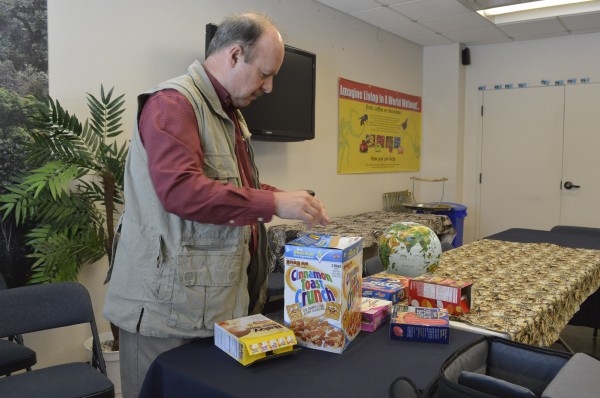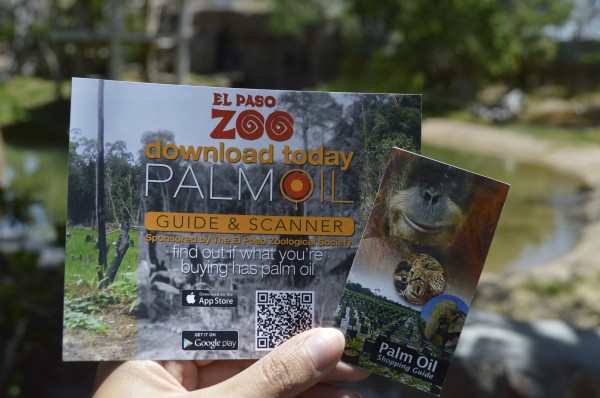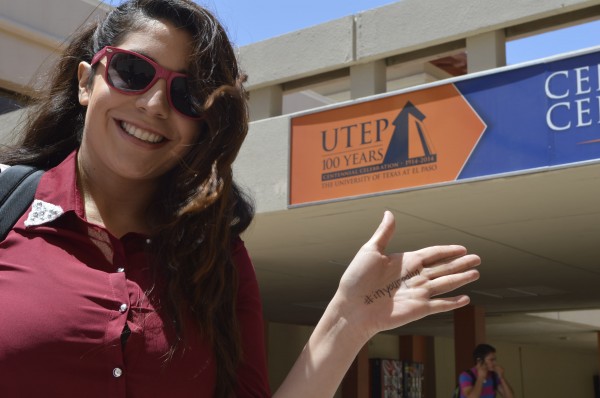EL PASO – The expanding production and use of palm oil has dire consequences for the environment, human health and rain forest wildlife according to those advocating a reduction in palm oil consumption.
Palm oil has a low trans-fat compared to vegetable oil but it is extremely high in saturated fat, which is one of the main causes for heart disease. Orangutans, Sumatran elephants, Asian elephants, the sun bear, rhinoceros, and tigers are at risk of extinction as companies expand plantations into rain forests.

Rick LoBello, Education Curator at El Paso Zoo shows popular foods that include palm oil in their ingredients. Photo credit: Flor Flores
Palm oil production is considered the main cause of deforestation of carbon-rich tropical peatlands, changing the forest landscape into wasteland.
“Palm oil awareness has really picked up over the past ten years, but the industry has only been around about thirty years. Palm oil has been around for thousands of years, but only as a minor product that was produced by people who knew how to use the palm oil fruit.” claims Rick LoBello, Education Curator at El Paso Zoo.
Palm oil plantations are creating massive damage to peatlands in the tropical rain forests of Southeast Asia and Indonesia as these areas are being cut down to open land for plantations.
A free app created by the El Paso Zoo — Palm Oil Guide and Scanner — scans products to inform consumers whether the product they are purchasing contains palm oil. People with heart problems are advised by doctors to avoid products containing palm oil.

El Paso Zoo's campaign to promote the use of their mobile application to identify products that include palm oil as an ingredient. Photo credit: Flor Flores
“It’s important to know that the World Health Organization, and the American Heart Association, and the FDA have all stated that palm oil is not healthy,” LoBello said.
Palm oil is found in many products of daily use from foods and cosmetics, to cleaning products. Products such as Listerine Mouthwash, Dove, Johnson’s Baby Products, L’Oreal, and Lysol use palm oil, but there are sustainable products that avoid it such as Mary Kay, Avon, Cover Girl, Revlon, Clinique, and Herbal Essences.
“Palm oil is a small ingredient in the U.S. diet, but more than half of all packaged products Americans consume contain palm oil—it’s found in lipstick, soaps, detergents, and even ice cream,” according to worldwildlife.org.
Some foods that contain palm oil are Ritz, Oreo’s, Frosted Flakes and others are made by companies such as Kellogg’s, Campbell’s, Kraft, and Heinz.
Greenpeace.org.uk states that, “Indonesia already has 66 million hectares of oil palm plantations, but has plans for another 4 million by 2015 dedicated to biofuel production alone.”
Some of the harm being caused is deforestation, animal habitat deconstruction of species in risk of extinction, deprivation of food, water, and destruction of farms in Sarawak, Sabah and Kalimantan, Borneo, Indonesia, and Malaysia.
“When it comes to the major animals that are being harmed because of palm oil the number of species is in no doubt in the thousands,” claims LoBello.
LoBello says that in the island of Borneo there is only 3 per cent of the original rainforest left.
Greenpeace also says that palm oils will create a bigger impact on climate change by, “clearing forests and draining and burning peatlands to grow palm oil will release more carbon emissions than burning fossil fuels.”
The El Paso Zoo is not the only local organization boycotting palm oil products. Also, Environmental Advocates is informing the local community about palm oil free products. The El Paso Zoo will be participating in the world-wide Global Day of Action, an event to encourage companies to find a sustainable replacement for palm oil.

Maite Martin, UTEP Environmental Advocates President, educating students on how they can take action to help the rainforest and boycott against palm oil industries. Photo credit: Flor Flores
“The other names for palm oil are numerous. There are actually 48 different names. Palm kernel oil is often used as a word to describe palm oil, palmitate is another word and then there is a whole list of scientific names,” LoBello said.
LoBello says the goals not to end the palm oil industry. “What we are trying to do is getting it to become sustainable. Which means we want palm oil only to be in products that come from plantations that have agreed to not cut down the rainforest,” he said.

Jessica Salcedo, UTEP student taking part of helping out orangutans and other species in risk of extinction. Photo credit: Flor Flores


There are better ways to improve palm oil practices that are friendly to earth, animal and poor farmers. In 2014, there’s surge in RSPO Certified Sustainable Palm Oil (CSPO), increasing to nearly quarter of all palm oil supply globally. Europe and other concerned major buyers should immediately purchase all these stocks to confirm demand exists for overrated “conflict-less palm oil”. Greenpeace should start buying campaign to finish CSPO stock, yesterday.
Greenpeace & Co’s “palm oil – global warming” argument is outdated and missing the elephant in the room. Greenpeace & Co fought the wrong battles and were in the wrong region (tropical areas). The World Meteorological Organization (WMO)’s red alarming dots all over northern hemisphere is testament to that failure, today. In April 2014 for the first time in human history, WMO scientists said CO2 exceeded 400 parts per million in the Northern Hemisphere!
The 2014 UN’s IPCC/FAO finding clearly singled out energy production sector (electricity & heating) as the worst culprit (25%) while livestock as the biggest GHG emitter/culprit from agriculture sector (24%), not productive crop like oil palm. In fact, UN scientists said in the same report that net greenhouse gas emissions due to deforestation registered a nearly 10 percent decrease over the 2001-2010 period, due to increases in the amount of atmospheric carbon being sequestered in many countries’ forest sinks.
Mind you tropical countries do not need to burn coal for their heating needs, and the vast mighty lush tropical forests did help sequester CO2 into oxygen. The WMO’s yellow dots along the tropics confirm this, just by looking at their remote stations in Danum Valley (Malaysia) and Bukit Kototabang (Indonesia).
It has been forewarned many times before, that the issue with poor small palm farmers becoming poorer due to discrimination, double-standard and expensive certifications in the name of ‘environment’ or ‘insert-your-stunt-here’ is real. Greenpeace & Co really need to answer what they’re pushing is truly all-encompassing, fair and ‘sustainable’ at all?
The United Nations clearly sets out that “sustainable development” must be based on economic, social and environmental progress. Millions of small farmers in Malaysia & Indonesia provide all 3, but Greenpeace & Co only want to focus on 1 – environmental. This is damaging, regressive, short-sighted, much less ‘sustainable’.